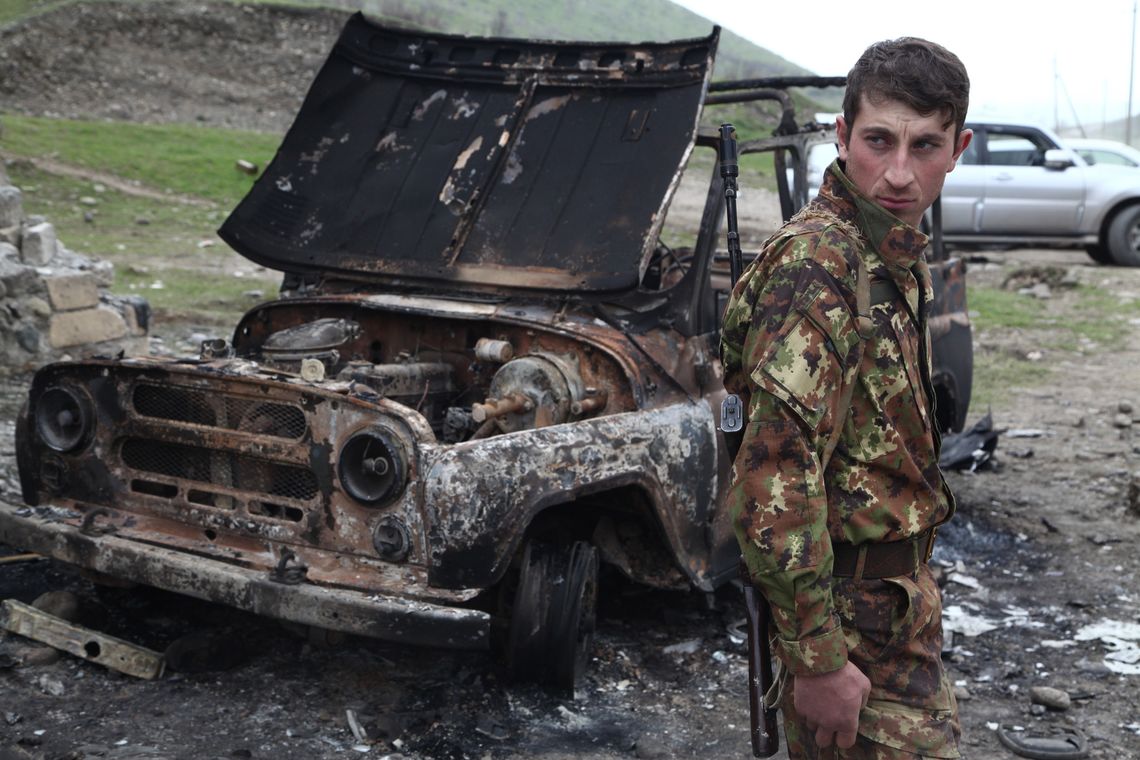Sat Apr 01 2017 · 6 min read
Nagorno Karabakh: The Four Day War
The Implications of Europe's Indifference

By Simone Zoppellaro

It’s a scene from another time. Young soldiers standing with an old rifle in their hands staring at the no-man’s land in front of them for months, sometimes years. Fatigue, boredom, loneliness and fear. Contrasting feelings mixing up with the heat of summer or the ice cold of winter. That is what I witnessed in my visits to Karabakh over the last several years. I remember meeting a boy from Yerevan in a military base in Martuni, next to the frontline. After we spoke for a couple of minutes, he smiled to me and my colleague and said, “I will never forget you.” I wonder how immense his solitude must have been to say something like this.
Only time looks frozen at this frontier of Europe, not the conflict. Soldiers know that the tranquility on the front may last long, but it’s just an illusion. Hundreds of lives were lost during the Four Day War last April and in other escalations over the last few years.
In Karabakh you can see kilometres of trenches running parallel along the front, reminiscent of the ones during the Great War one hundred years ago. For a European observer, this comparison is impossible to ignore. If today we don’t have the human wave attacks that cost countless victims at that time, it’s also true that the Karabakh conflict lasted longer – more than 25 years – and is still far from a resolution.
As an Italian, I find it painful to see how trenches that look identical to those used in the Alps during the war described by Pope Benedict XV as an “useless slaughter” still exist. Analysts and media tend to insist on the geopolitical implications of the Karabakh conflict, often underlying how this small-scale confrontation could erupt one day into something bigger, with a possible domino-effect for neighbouring countries. But this is just one aspect of the conflict, and not the most urgent. Largely ignored by the international community, the conflict is also a long-lasting humanitarian crisis. An issue that, until the present day, nobody really wanted to address. Not even after the April War, and this despite several announcements made by European politicians one year ago.
“ When I think about the role of Europe in the Nagorno Karabakh conflict, I always think about Dante and the uncommitted. ”

The result is that entire generations of young men from the South Caucasus – and especially the poor – have seen their life marked by the traumatic experience of trench warfare. But the risk doesn’t involve only the soldiers on the frontline. Cases of bullying of recruits by senior soldiers, together with the countless episodes of abuses and suicides – alleged or real – occurring in the military bases are frequent, not to mention the periodic civilian fatalities in Karabakh or at the border of Azerbaijan and Armenia. This rather small territory has the highest per capita incidence of landmine accidents worldwide. As stated by the British organization Halo Trust, not less than a third of the cases are affecting children. Hundreds of thousands of IDPs and refugees are still living far from their cities and towns, often in miserable conditions. What is remarkable and clear is the negative effect of the conflict on
the economic and democratic development of the region.
Tragedies and issues that the great majority of Europeans have completely ignored since the very beginning of this war. There could be many possible explanations for that, but absolutely no excuse. If accusations against Russia are frequent as attested to by many in the region as the main side responsible for this ongoing conflict, the real picture is much bigger. The role of Moscow is significant, of course, as we could see taking into consideration the volume of arms trade to both Azerbaijan and Armenia. But it is not only Russia that should be held accountable. As the failure of the leadership of the two rival states is also a primary factor, the truth is that the Karabakh conflict represents at the same time a major failure of the EU institutions and of the very idea of Europe.
Dante, a great political mind not less than a protagonist of world literature, put the souls of the uncommitted in the Vestibule of Hell in his “Divine Comedy.” The uncommitted represent, for him, the people unable to take sides in history, those who lack any will and decide to stay neutral at any price. In his masterpiece, the Italian poet makes no mystery of his personal contempt towards these figures, that his literary imagination punishes in the cruellest way. When I think about the role of Europe in the Karabakh conflict, I always think about Dante and the uncommitted. The point is that the moral and political responsibility of a conflict doesn’t rest solely on the actors, or those who contribute to arm them. It rests also on the nations that would have the power to intervene and stop the hostilities but prefer to keep themselves detached or indifferent. In this sense, the role of the European government and institutions is not less than criminal.
If Russia can still have so much influence on the South Caucasus until today, it’s primarily because of the absence of Europe from the regional theatre, because of the abdication from its natural role and responsibility. If the Karabakh conflict still exists and peace looks more distant than ever, it’s also our responsibility as Europeans.
We are used to condemning Stalin and his crimes against humanity, but we rarely take into consideration that many issues we are dealing with today are part of his heritage. Karabakh is one of them, since it was the dictator himself, before becoming the leader of the Soviet Union, who decided the fate of this disputed land. Once again, the impossibility of finding a new territorial definition for this and other cases should be regarded as a failure of the main idea that forged that political experiment called Europe. A project whose crisis can be easily detected examining the resurgence of the most violent forms of nationalism at the borders of Europe, as we have seen recently in Ukraine. Now, I don’t want to be misunderstood. It’s not my intention to say that European governments or institutions should take part in this or other conflicts supporting any nationalistic claim. Quite the opposite. They should find the courage of forcing the frame of nationalism to propose new territorial definitions that could allow Armenians and Azerbaijanis to live together in peace in Karabakh.
Easier said than done, for sure, but if the European Union exists today, it is precisely because we understood – after the experience of fascism and two World Wars – that the idea itself of a nation-state based on race or religion will inevitably bring about catastrophe. With all the obvious limitations of an integration process that has entered in crisis after Brexit, its message is still powerful: where trenches like those of Karabakh existed, now there are no borders; where we had towns reduced to rubble like Aghdam, now we have some of the most prosperous cities in the world. Brussels and the EU governments, if they still want to be considered as reliable actors in the region, can’t continue to ignore the existence of this conflict inside its borders – because there is no doubt that the South Caucasus belongs to Europe. They should stop pleasing dictators and oligarchs, stop prioritizing business and resources instead of politics, and abandon once and for all this form of passive neutrality that – cloaked in moral superiority – simply allows this bloodshed to continue without any break since the fall of Soviet Union. It’s time for a Copernican revolution in our approach to Karabakh. No easy path, for sure, but it’s an inevitable step to be taken in order prevent the risk of a new open war in Europe that, now more than ever, looks like a concrete possibility.


